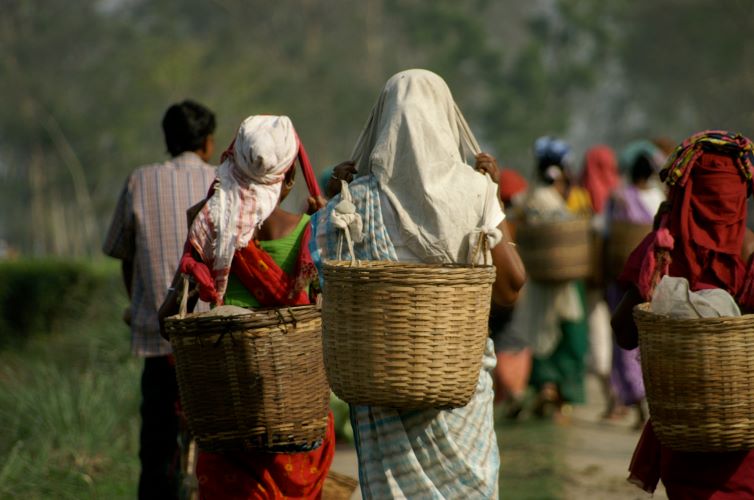The Union Government’s announcement that almost 10 million gig workers in India are to be immediately granted basic health insurance and allowed to register online to access social security benefits has been heralded as a “game changer” in extending employment and social security rights to workers in the unorganised sector.
News
Government announces long-awaited social security and health insurance measures for India’s gig workers
In the Union Budget for 2025-26 announced in February, Finance Minister Nirmala Sitharaman revealed that gig workers employed by online platforms such as food delivery apps would be issued with identify cards and steps will be taken to streamline their registration on e-Shram, India’s national database that enables workers in the unorganised sector to apply for and obtain social security benefits they are eligible for.
The finance minister also announced that gig workers employed by online platforms will be granted access to public health insurance under the PM Jan Arogya Yojana scheme, or ‘PM-JAY’ (Ayushman Bharat Pradhan Mantri Jan Arogya Yojana, or Prime Minister’s People’s Health Scheme). PM-JAY provides free health insurance coverage for low-income earners, covering the cost of medical and hospital treatment up to Rs 5 lakh per year for every eligible family, and is the world’s largest government-sponsored healthcare programme.
Gig workers employed by app-based platforms, such as taxi, food delivery, beauty treatment and home cleaning services, have historically lacked fundamental benefits and protections enjoyed by regular employees in the organised sector, such as job security, health insurance and retirement plans.

Gig economy ‘rapidly expanding’
At the same time, the gig economy is rapidly expanding, with NITI Aayog, the Union Government’s official think tank, predicting in a 2022 report that India’s gig and platform workforce will see huge expansion, from 7.7 million in 2020-21 to 23.5 million by 2029-30, making up approximately 4.1 per cent of India’s total workforce.
According to the Code on Social Security, 2020, a gig worker is anyone who performs work or earns income outside the traditional employer-employee relationship, typically in on-demand jobs such as food delivery, ride-hailing or freelance work.
The inclusion of gig workers in the PM-JAY scheme follows recommendations made by the National Health Authority to expand coverage to those without any form of health insurance.
This decision reflects the broader vision laid out in the Union Government’s National Health Policy 2017, which set a goal to provide universal health coverage to all citizens. The policy emphasises that health should not be dependent on employment status or income level, and everyone should have access to affordable and quality healthcare. According to commentators, extending the PM-JAY scheme to gig workers brings India closer to this vision, contributing to the overall goal of reducing health inequalities.
Pilot initiative
To register platform workers and the aggregator companies on the e-Shram portal, a pilot initiative was launched by the Ministry of Labour and Employment in September 2024. In addition, an ‘Aggregator Module’ has been tested, allowing digital platforms to register themselves and their employees on the e-Shram portal, in preparation for allowing gig workers to apply for eligible social security benefits. In this pilot phase, four prominent aggregators - Urban Company, Zomato, Blinkit and Uncle Delivery - have successfully completed their registration.
In a statement, the Ministry of Labour & Employment said: “The Budget 2025 announcement marks a significant expansion of this initiative, facilitating a considerable increase in its scope and formalising these efforts.
“With improved resources, the initiative will guarantee that all gig and platform workers can access vital social security benefits via the e-Shram portal, thereby underscoring the Government's commitment to protecting the interests of this workforce.
“The Ministry remains focused on the seamless execution of these initiatives, addressing any operational challenges, and strengthening collaboration with digital platforms. By combining early groundwork with large-scale policy support, the Government aims to create a robust safety net for gig workers, ensuring their security and well-being in India’s evolving employment landscape.”
‘Transformative step’
Hailing the decision, Union Minister for Labour and Employment and Youth Affairs & Sports, Dr. Mansukh Mandaviya, said: “The gig workforce is a vital pillar of India’s new-age economy, driving innovation and efficiency across digital platforms.
“Recognising their contribution, the Government’s decision to provide them with identity cards, e-Shram registration, and healthcare security under PM Jan Arogya Yojana is a transformative step towards their social security and wellbeing. This initiative will empower nearly one crore (10 million) gig workers.
“Beyond this, the Government remains committed to extending social security benefits to workers in other unorganised sectors as well, ensuring dignity, security, and prosperity for every worker in the country.”
The move has been welcomed by commentators and follows a long-running campaign by gig worker unions and platform workers, calling for employment and social security rights and protections to be extended to workers employed by aggregators. In the most recent wave of protest, on Diwali Day 2024, female gig workers engaged by online platforms went on strike to draw public attention to their poor working conditions and the lack of labour rights in the gig economy, in industrial action organised by the Gig and Platform Workers Union (GIPSWU).
‘A paradigm change’
In an opinion piece published by The Times of India, Vivek Krishna, vice president of finance at Rapido, the Indian motorcycle and scooter taxi rise app, said the Government’s move to formally register gig workers through identity cards and streamline access to welfare schemes is “not just a policy shift but a paradigm change”.
He added: “Including gig workers in PM-JAY, offering health coverage of up to ₹5 lakh per family per year, is a crucial step towards addressing their long-standing vulnerabilities. This initiative, benefiting nearly 10 million gig workers, could be a game-changer, ensuring they do not fall into financial ruin due to medical emergencies.”
However, he warned that “policy announcements are only as effective as their implementation. The real test will lie in how swiftly and effectively these measures translate into on-the-ground impact.”
He added: “Engaging with stakeholders - businesses, workers, and policy experts - will help shape policies that align with evolving workforce dynamics. While bold steps have been taken, the path to a sustainable and equitable economic framework remains an ongoing journey.”
‘Significant milestones’
Meanwhile, writing on LinkedIn, Naveen Budda, co-founder at KarmaLife.ai, an online platform that allows digital platforms to provide gig workers with credit solutions such as wage advances, said the Government’s move was a “landmark initiative” that means the gig economy is “finally getting the recognition it deserves”.
“Identity cards, registration on the e-Shram portal, and access to affordable healthcare are significant milestones that can help gig workers mitigate the impact of income volatility,” he wrote. “As gig workers face irregular and often unpredictable earnings, these benefits are crucial in ensuring their long-term financial wellbeing.”
“The government’s measures - especially the inclusion of gig workers in structured social security frameworks under the Code on Social Security, 2020 - lay the foundation for sustainable welfare solutions.”
However, he warned: “While the 2025 budget marks a significant step forward, there’s more to be done. Policymakers should continue building on this momentum by further expanding financial literacy programs for gig workers, incentivising savings, and enhancing access to insurance. Additionally, digital platforms and fintechs should collaborate to provide holistic solutions that cover immediate needs like credit access, long-term goals like savings, and safeguards like health insurance.”
Highest budget allocation for labour welfare and employment generation
In alignment with the Government’s commitment to promoting labour welfare and employment opportunities, the Union Budget allocated ₹32,646 crore for the Ministry of Labour and Employment in the financial year 2025-26. This figure represents the highest allocation to date and is nearly 80 per cent greater than the revised estimates from the previous year.
Expressing gratitude to Prime Minister Narendra Modi for the increased labour budget, Dr Mandaviya said: “Our focus is firmly on the newly announced Employment Generation Scheme, for which the budgetary allocation has been doubled from ₹10,000 crore to ₹20,000 crore.
“The allocation under the Employees’ Pension Scheme has been increased by ₹300 crores and under the PM Shram Yogi Maandhan Yojana by 37 per cent, compared to last year.”
For more information see:


NEWS

India’s social security coverage doubles to almost 50 per cent, says ILO
By Orchie Bandyopadhyay on 08 April 2025
The proportion of India’s population covered under some form of cash paying social security protection has almost doubled in just three years, according to a new International Labour Organization (ILO) report.
Venue owners have two years to tighten up safety as Martyn’s Law passes Royal Assent
By on 01 January 0001

